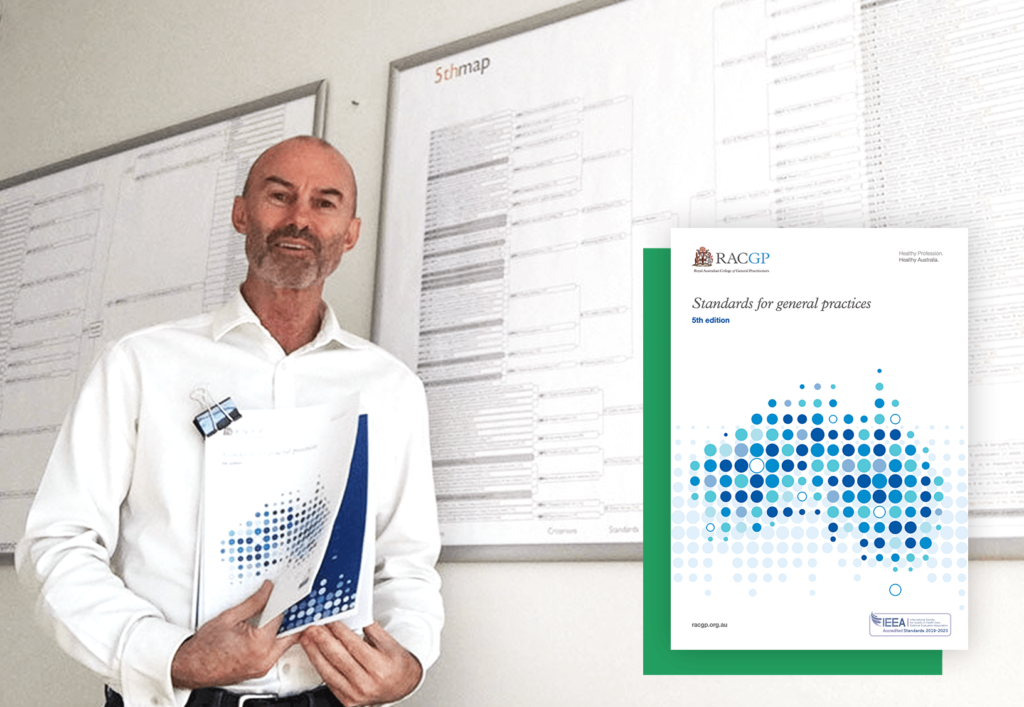HMR Referrals is a national solution, helping Australian general practices deliver better medication management outcomes to their patients.
In just 12-months of operation, HMR Referrals has won several awards, including winning the Victorian services category at the iAwards, and placing second at the national iAwards finals for Infrastructure & Platforms Innovation. They also won a gold medal at the 2017 TECH Design Awards.
I sat down with HMR Referrals Founder and CEO, Vladimir Finn, to find out how the idea for HMR came about and how the system can best serve general practices.
How does HMR work?
“The home medication review system is triggered directly from within a GPs clinical system, so practices can do referrals the way they normally do. The difference is that once the referral is put into the system it is electronically sent to an accredited pharmacist who is available in the local area and willing to accept the referral. The GP is notified once a pharmacist accepts the request.
“The pharmacist then sees the patient and creates a report using the same systems. This report is automatically returned to the GP and is formatted in a way that is easy for the doctor to digest. The system requires no pop-ups or additional websites, and removes all paper and faxes from the referral process.
What were the steps that led you to start HMR Referrals?
“My start in health was in medication re-ordering which led me to a lead role in Medisecure, one of two national electronic prescribing system. In my time there I launched the NFP ScriptWise.org which allowed me to see the incredible damage addiction to prescription medication can do. This also led me to work with very forward thinking practices which later became the first implementers of removing paper from their referrals process.
Whilst there my father ended up in hospital from what is called a medicine misadventure, which is when you have interactions with medicine that go badly and you often end up in hospital with all sorts of side effects.
“He was on multiple medications and had a clash from taking something that he shouldn’t have been taking and ended up in hospital. When I was talking to his doctor, helping with translation, the doctor said he really should have had a home medicine review. I had to ask what a ‘home medicine review’ was as the doctor said this would have more than likely kept him out of hospital as it would have pointed out what he shouldn’t have been taking. That’s when the journey started for me.
“I started talking to doctors at the clinics I was already working with about why HMRs weren’t already prevalent and what I discovered was that GP clinics across the board had stopped referring HMRs when the national cap was introduced for accredited pharmacists.
“National caps came in over three years ago, limiting the number of HMRs an accredited pharmacist is allowed to do in a month to only 20. This had a adverse impact on how many patients GPs referred because it was a lot of paperwork, they didn’t know which accredited pharmacists were available to service the patient, and often the reports would take months to come back.
It meant patients weren’t getting a timely review and sometimes GPs weren’t getting reports back at all. Within a matter of months this cap killed the whole process for many doctors and accredited pharmacists nationally.
Obviously, some doctors still do HMRs, but not consistently for all of their eligible patients.
“Since then most clinics have pretty much stopped doing referrals, or they’re doing very few. Even though their patients could benefit greatly. This was the point of HMR Referrals. We wanted to bring in a service that GPs trusted, where patients received this important service, and where accredited pharmacists could utilise their quota fully each month.”
What is the coverage of HMR Referrals nationally?
“We’ve been running for 18 months since our official launch and have individual clinics and large clinic groupd across WA, SA, VIC, and QLD. Over the next month NSW and Tasmania will have clinics onboarded. We also have a great group of accredited pharmacists nationally on the platform servicing the HMRs in record time.”
Which patients benefit most?
“There is one significant criteria for patient eligibility based on the HMR Referral MBS item 900. This is where there is a risk of a patient having a medicines misadventure. This includes a number of examples, ranging from a patient using five medications or more, to patients using medications with a low therapeutic index, patients using medications that require a significant number of doses in a day or a week, situations where the patient is unclear about how to take their medication, and even times when a patient has been discharged from hospital and returns home with a number of new medications.
“These are the broad examples but when it comes to criteria there is only one and that is that the patient is at risk of medicines misadventure. In particular, we see patients with chronic disease benefit most from HMRs, which form part of their CDM and care plans.”
Which clinics benefit most?
“Clinics who look at HMR find that the best place to implement the process of electronic HMR is in chronic disease management (CDM). So, nurses, specialist doctors etc involved in CDM teams are most interested in the review as it provides direct feedback about the medications and the patient’s understanding of the medications.”
How does HMR Referrals benefit clinics?
“The review provides the doctor with three key pieces of information, which is difficult to gauge without the system. Firstly, the system combines what the doctor prescribes with what the patient is actually taking. Secondly, the system reviews how the patient is managing their medication such as what tools they use, how they store items and so forth. The third thing is the system educates the patient more broadly about how the medications interact and what is most important to understand.
“What accredited pharmacists absolutely do not do, is provide any kind of recommendation to the patient about the medication such as dosage. That is the role of the GP. The accredited pharmacist only provides their concerns and recommendation to the doctor. The system also absolutely does not mix the understanding of the community and accredited pharmacy. The community pharmacy dispenses the medication. The accredited pharmacist goes through intense training to ensure the best quality. We simply allow the different parties to connect.”
How to get HMR Referrals for your clinic?
Contact HMR Referrals directly on: (03) 9036 3960
Or via their website: www.HMRreferrals.com.au
Once you have HMR Referrals in your clinic, speak to us at HotDoc about how we can make your patient eligibility and engagement for HMRs work even more smoothly.



